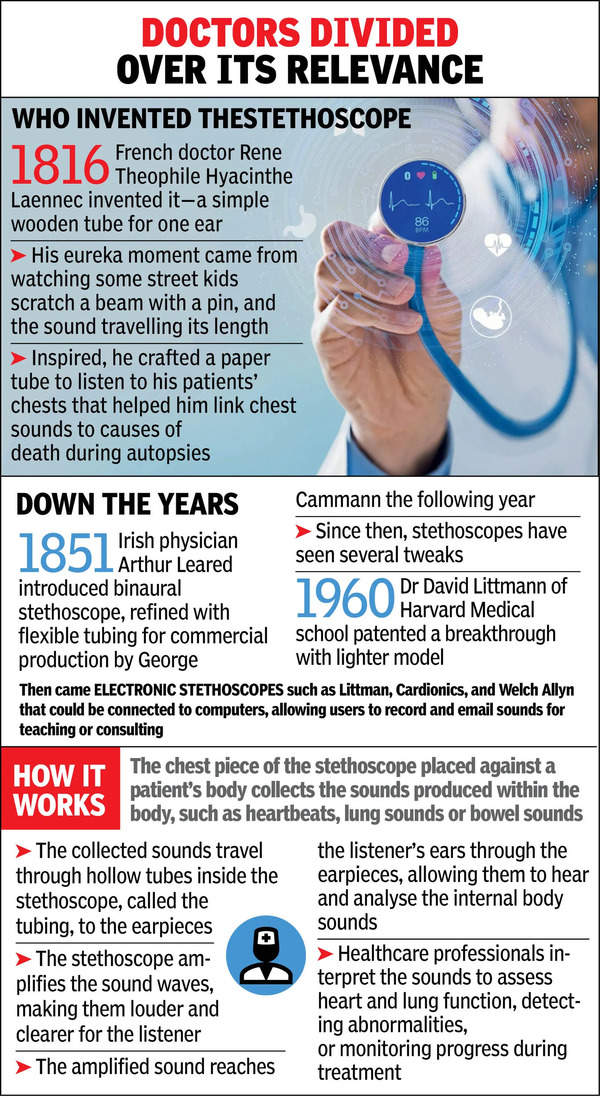The real issue, Dr Pinto said, is that the skill of using the instrument may have taken a beating among today's physicians. “What's happening is students are not being trained to use stethoscopes as well as they used to because there's an inclination to do tests left, right and centre,” he said.
Mumbai: For over 200 years doctors have leaned on this trusty medical tool to poke, prod, listen and draw accurate inferences about what ails the patient. Until technology changed it. With echocardiograms and nifty pocket-sized ultrasound devices elbowing their way into the diagnostic arena, a recent conference on AI and healthcare at Bombay Hospital in Marine Lines, became the stage for doctors to deliberate the fate of this iconic medical relic—the stethoscope and whether the revered art of “auscultation”— the act of detecting maladies from listening to sounds from the heart, lungs or other organs—might actually follow the path of the doctor’s head mirror and fade away.
In 2016, as the stethoscope hit its bicentennial milestone, The Guardian wrote about how instead of celebrating its age, the world might be witnessing the beginning of its end after Dr Jagat Narula, a prominent Indian-origin cardiologist in New York, declared that “the stethoscope is dead” while W Reid Thompson, an associate professor of paediatrics at Johns Hopkins University School of Medicine countered it. Closer home, the medical fraternity remains sharply divided. Read more at:http://timesofindia.indiatimes.com/articleshow/109847714.cms?utm_source=contentofinterest&utm_medium=text&utm_campaign=cppst
According to interventional cardiologist Dr Satyavan Sharma, advancements in technology will diminish the reliance on traditional stethoscopes. He predicts the analogue version—where doctors listen to the heart and lungs by placing a probe in their ears and the chest piece on the patient—will face formidable competition from electronic, digital, and now AI-powered versions. “Gradually, the shape will change. Doctors will move around with AI-enabled ones, rather than using their ears and the brain,” says Sharma, adding AI-based devices have the ability to analyse and offer diagnosis instantly, limiting manual interpretation. Dr Lancelot Pinto, a respirologist, however, scoffs at the idea of a stethoscope-less world in medical practice. “It’s just evolved in different ways,” he says, pointing out that AI-based technologies now incorporate acoustic analysis, with devices like the one he developed at IIT that can attach to a stethoscope, record, and analyse sounds graphically and be transmitted via bluetooth or an app. “But these advancements don’t mean that the stethoscope is redundant as the first point of contact with a patient,” adds Pinto. Stethoscopes can detect heart murmurs for cardiac irregularities, lung sounds for respiratory issues, and bowel sounds for gastrointestinal assessments.However, many of these functions are now being taken over by new-age diagnostic devices, sometimes with greater efficiency, said Dr Arun Nayak, head of gynaecology at LTMG (Sion) Hospital. He said fetal doppler machines, for example, excel in listening to fetal heartbeats and earlier into a pregnancy. “To think the stethoscope won’t change with technology would be naive,” Dr Nayak said.Six months ago, the UK launched a programme under which they planned to deploy AI-enabled smart stethoscopes to 100 general physicians to aid in the early diagnoses for heart failure. Dr Sharma, though, believes countries like India will continue to rely on traditional stethoscopes longer than others due to their ease of use and affordability.Interestingly, despite the advancements, the classic device remains a cornerstone of diagnosis taught in all medical colleges. “Medicine cannot be taught until students learn to interpret heart murmurs and abdominal sounds,” said internal medicine expert Dr Niteen Karnik.The real issue, Dr Pinto said, is that the skill of using the instrument may have taken a beating among today’s physicians. “What’s happening is students are not being trained to use stethoscopes as well as they used to because there’s an inclination to do tests left, right and centre,” he said. Cardiologist Dr Sharma agrees that it is the overall art of clinical diagnosis that is under threat and not stethoscope alone. “The moment you meet a patient, initiate dialogue, and then physically examine them, it’s about building a connection. That connection may be lost,” said Sharma. He isn’t ready to bid farewell to his trusted sidekick just yet. “It will remain my companion until the end,” he assures.




Comments